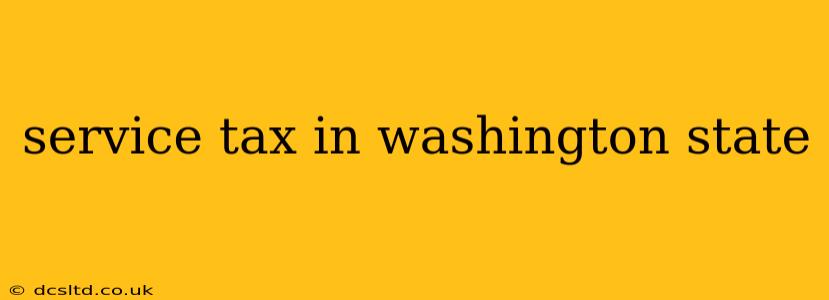Washington State does not have a statewide sales tax on services. This means there's no specific "service tax" levied by the state government on most services provided within Washington. However, the situation is more nuanced than a simple "no service tax" answer, and understanding the complexities is crucial for businesses and consumers alike.
What Taxes Might Apply to Services in Washington State?
While there's no dedicated service tax, several other taxes could apply to services depending on the specific service provided and the nature of the transaction. These include:
-
B&O Tax (Business and Occupation Tax): This is a broad-based tax levied on the gross receipts of businesses operating in Washington. Many service businesses are subject to the B&O tax, regardless of whether they charge sales tax to their clients. The rate varies depending on the type of business activity. For example, a landscaping business will likely pay a different B&O tax rate than a consulting firm.
-
Sales Tax (on Certain Services): While Washington doesn't have a general service sales tax, sales tax does apply to certain services, typically those considered "tangible personal property," even if the service itself is intangible. This can be confusing and requires careful consideration of the specific service offered. For example, if a contractor installs a new roof, the cost of the roofing materials would likely be subject to sales tax. However, the labor costs for installation might not be.
-
Other Local Taxes: Some cities and counties in Washington may have additional local taxes that apply to certain services. These vary widely in their scope and rates, so businesses operating within specific jurisdictions need to check local regulations.
Is there a sales tax on services provided by contractors in Washington?
This depends heavily on the specifics of the contract. As mentioned above, the sale of tangible personal property (like building materials) is subject to sales tax. However, the labor itself for a contractor service is generally exempt. This distinction is crucial and requires careful review of Washington State Department of Revenue guidelines. Confusion often arises, so consulting with a tax professional is advised to ensure accurate tax compliance.
What types of services are typically exempt from sales tax in Washington?
Services generally exempt from Washington sales tax include many professional services, such as those offered by:
- Doctors and Dentists: Medical and dental services are generally exempt.
- Lawyers and Accountants: Legal and accounting services are usually exempt.
- Consultants: Many consulting services are exempt, though this depends on the specific service provided and often requires a careful assessment of the nature of the work.
However, it's crucial to remember that this is not an exhaustive list, and the taxability of a specific service can be complex. Always refer to the Washington State Department of Revenue website for the most up-to-date information.
What is the difference between B&O tax and sales tax in Washington?
The B&O tax is a tax on the gross receipts of a business, while sales tax is a tax on the sale of goods and certain services to customers. A business might owe both B&O tax and sales tax, depending on the nature of its business and transactions. They are distinct taxes with different calculation methods and reporting requirements.
How can I find more information about Washington State taxes?
The best resource for accurate and up-to-date information on Washington State taxes is the official website of the Washington State Department of Revenue. Their website offers comprehensive guides, FAQs, and contact information to help businesses and individuals understand and comply with tax regulations. For complex tax situations, consulting a tax professional is highly recommended.
Disclaimer: This information is for general guidance only and should not be considered professional tax advice. Always consult with a qualified tax professional or the Washington State Department of Revenue for specific advice regarding your tax situation.
